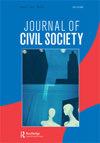Introduction to special issue on Civil Society in South Asia
IF 0.9
Q3 POLITICAL SCIENCE
引用次数: 1
Abstract
The articles included in this special issue were, with one exception (from an author who was unable to obtain a visa to travel to India), presented at a workshop on civil society in South Asia, held in Hyderabad in South India in March 2018. The workshop was organized jointly by the Aga Khan University’s Institute for the Study of Muslim Civilisations, based in London, and the Aga Khan Academy in Hyderabad. Both organizing institutions belong to the Aga Khan Development Network, which has for many years seen the strengthening of civil society through the promotion of community-based organization and initiative as a core part of its work. The purpose of the Hyderabad workshop was not, however, to focus only or even primarily on the way that contemporary development discourse has incorporated ideas of voluntarism and local initiative into its work but to consider how a concept that emerged from seventeenth and eighteenth century European reflections on social and political life in the age of absolutism has been received by scholars and intellectuals in different times and places, and the extent to which it can illuminate contemporary political movements as well as offering ways to address and engage with the full range of issues that concern the contemporary world. Gurpreet Mahajan sets out one of the key issues by contrasting the abstract universality of certain conceptions of civil society with the lived reality of noisy quotidian politics. This tension can be observed in all states but is particularly striking in South Asia, where the legitimacy of post-colonial institutions is constantly challenged, and where, spurred on by international agencies, non-governmental organizations (NGOs) have become major service providers. Mahajan’s article includes a section that deals specifically with organizations that have an explicit focus on the needs of particular religious populations, a theme that is also the focus of the contributions by Rowena Robinson and Sanjeer Alam. She argues that the work of such organizations can benefit the wider society both directly and indirectly, even while carrying an element of risk to social integration and democratic values. More generally, it is precisely these divergent interests and value-orientations that make up the democratic imaginary. Two of the contributors to this special issue, Harihar Bhattacharyya and Sanjeeb Mukherjee, continue the themes raised by Mahajan by engaging with the work of Partha Chatterjee. Chatterjee has made one of the most influential interventions in the debate over civil society in regions such as South Asia and his work over many years has advanced the idea that civil society is indeed a Western concept that transplants poorly to a South Asian postcolonial context. Those who wish to accompany him on南亚民间社会特刊简介
本期特刊所载文章均于2018年3月在印度南部海得拉巴举行的南亚公民社会研讨会上发表,但有一篇文章例外(作者未能获得前往印度的签证)。这次研讨会是由位于伦敦的阿迦汗大学穆斯林文明研究所和位于海德拉巴的阿迦汗学院联合举办的。这两个组织机构都属于阿迦汗发展网络,该网络多年来一直把通过促进以社区为基础的组织和倡议来加强民间社会作为其工作的核心部分。然而,海德拉巴研讨会的目的不仅仅是,甚至主要是关注当代发展话语如何将唯意志论和地方主动性的思想纳入其工作,而是考虑从17世纪和18世纪欧洲对专制主义时代的社会和政治生活的反思中出现的概念是如何被不同时间和地点的学者和知识分子所接受的。以及它能在多大程度上照亮当代政治运动,并提供解决和参与当代世界所关注的各种问题的方法。Gurpreet Mahajan通过将公民社会某些概念的抽象普遍性与嘈杂的日常政治的生活现实进行对比,提出了一个关键问题。这种紧张关系在所有国家都可以观察到,但在南亚尤其明显,在那里,后殖民制度的合法性不断受到挑战,在国际机构的推动下,非政府组织(ngo)已成为主要的服务提供者。Mahajan的文章中有一节专门讨论了那些明确关注特定宗教人群需求的组织,这也是Rowena Robinson和Sanjeer Alam的贡献的重点。她认为,这些组织的工作可以直接和间接地使更广泛的社会受益,即使对社会一体化和民主价值有一定的风险。更一般地说,正是这些不同的利益和价值取向构成了民主的想象。本期特刊的两位撰稿人Harihar Bhattacharyya和Sanjeeb Mukherjee通过参与Partha Chatterjee的工作,继续了Mahajan提出的主题。查特吉在南亚等地区关于公民社会的辩论中做出了最有影响力的干预,他多年来的工作推动了这样一种观点,即公民社会实际上是一个西方概念,在南亚后殖民背景下移植得很差。那些愿意陪伴他的人
本文章由计算机程序翻译,如有差异,请以英文原文为准。
求助全文
约1分钟内获得全文
求助全文

 求助内容:
求助内容: 应助结果提醒方式:
应助结果提醒方式:


